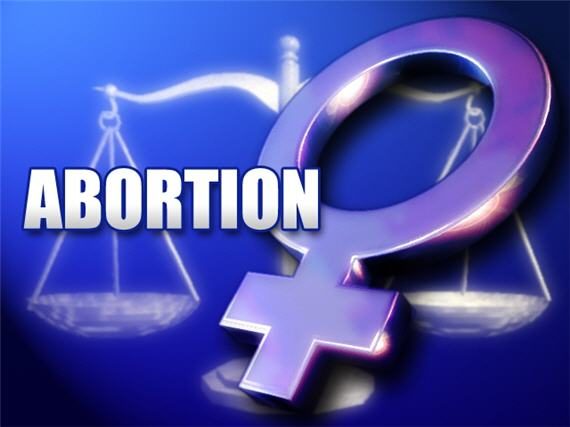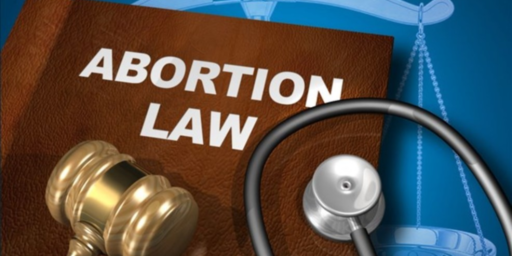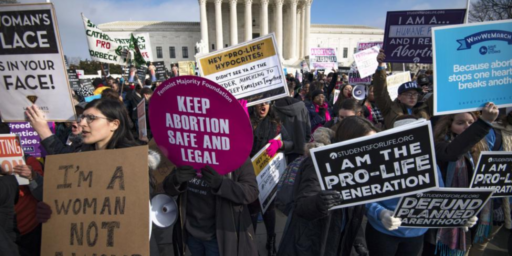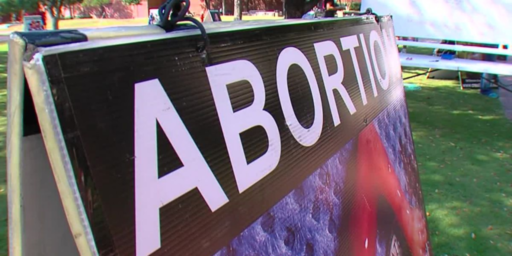States Working To Chip Away At Abortion Rights While Trump Remakes The Judiciary
While the Trump Administration slowly tries to remake the Federal Judiciary, states are moving to pass radical new challenges to Roe v. Wade.
Yesterday, Iowa’s Governor signed into law a bill that would ban abortion after the sixth week of pregnancy:
Iowa Gov. Kim Reynolds on Friday signed a bill that would prohibit abortions after a fetal heartbeat is detected. It is one of the most restrictive laws of its kind in the United States and one that Republicans hope will pave the way for a showdown at the U.S. Supreme Court.
The “heartbeat” bill, which would ban abortions as early as six weeks — around the time women generally feel early signs of pregnancy and before many realize they are pregnant — was passed Tuesday by the Iowa House, 51-46. The state Senate passed the bill 29-17 early Wednesday, sending it to Reynolds (R), who has said abortion is “equivalent to murder.”
State Rep. Shannon Lundgren (R), while speaking on the House floor Tuesday, called the bill “a courageous step” that sends the message that Iowa “will defend its most vulnerable, those without a voice — our unborn children.”
State Rep. Beth Wessel-Kroeschell (D) slammed her Republican colleagues. “So what made you decide to vote for this bill today?” she said on the floor Tuesday. “Obviously, there are 51 members of this body that feel they know more than the medical experts on what is good medical practice.”
The law requires women seeking an abortion to first have an ultrasound, at which time a physician would detect whether there is a heartbeat. It also would prohibit someone from acquiring, providing, receiving, transferring or using a fetal body part in Iowa. A violator could be charged with a Class C felony.
Similar legislation has been passed in other states. The governors of Mississippi and Kentucky recently signed into law bills that ban abortion after 15 and 11 weeks, respectively. Federal judges have temporarily blocked those bills. But as The Washington Post’s Mary Jordan wrote last month, these antiabortion bills are meant to set up legal challenges that would take the case to the U.S. Supreme Court in an attempt to overturn Roe v. Wade, the landmark ruling that prevented states from banning abortions outright.
Republicans are banking on an opportunity for President Trump to nominate a conservative judge who could help overturn the 1973 ruling. Justice Anthony M. Kennedy, 81, a centrist, is said to be considering retirement. Justices Ruth Bader Ginsburg and Stephen G. Breyer, two of the court’s liberals, are 85 and 79, respectively.
According to the Des Moines Register, Iowa Republicans said during a debate Tuesday night that they hope the law faces a legal challenge so that it can advance to the Supreme Court. The Register also reported that exceptions in cases of rape and incest were added to the bill before the Senate passed it Wednesday morning.
At an antiabortion event last year, Reynolds advocated for legislation “that protects mothers and the unborn.”
“All of you are part of the movement that elected a pro-life president and vice president in President Trump and Vice President Pence,” she told supporters, adding that they are “shifting the direction of the Supreme Court.”
Iowa isn’t the only state moving to restrict abortion rights and test the precedent established in Roe and its progeny, an even stricter legislation has passed the South Carolina Senate, but its fate going forward is unclear:
The S.C. Senate voted Wednesday night to outlaw virtually all abortions in South Carolina.
The Legislature’s upper chamber voted 28-10 to allow exceptions only in cases of rape, incest or medical emergencies that could seriously harm the pregnant woman or threaten her life. The bill still faces long odds to passage, up against a Democratic filibuster that could put off a final Senate vote until after lawmakers adjourn for the year.
If passed, the new law almost certainly would spark a court challenge. But that is the goal, according to Senate Republicans who want to overturn the 1973 U.S. Supreme Court decision affirming abortion rights.
“It’s designed to give the court an opportunity to revisit Roe v. Wade,” said Senate Majority Leader Shane Massey, R-Edgefield.
The proposal likely would ban some 97 percent of the roughly 5,700 abortions performed in South Carolina each year, according to the Democrat who suggested Republicans adopt it
“It’s clearly unconstitutional from my point of view,” said state Sen. Brad Hutto, D-Orangeburg.
Just before 10 p.m. Wednesday, Hutto proposed the expanded abortion ban as an amendment to a House bill outlawing “dismemberment” abortion, a rare procedure used to terminate 22 pregnancies in 2016.
Hutto said his aim was to give Senate Republicans a chance to vote on the bill they really want so the S.C. Legislature doesn’t continue to be bogged down year after year with debates on more nuanced abortion restrictions.
Settling the abortion issue would mean S.C. lawmakers can get to other important topics, including South Carolina’s $9 billion nuclear fiasco, Hutto said.
“It’s an attempt to get it to the courts so we don’t have to keep debating it over and over and over,” said Hutto, an attorney who said he is confident the courts would strike down the abortion ban in a court challenge.
Debate on the “dismemberment” ban had lasted two days in the Senate, and Democrats were planning to filibuster another several days — potentially until the end of the legislative session next week.
Shortly after Hutto proposed his amendment, it was adopted 24-1. State Sen. Marlon Kimpson, D-Charleston, cast the lone vote opposing the amendment as most Democrats sat on the sidelines.
The Senate voted for the overall bill 28-10 about an hour later. It still needs one more vote to pass the Senate, and Republicans expect Democrats to filibuster the amended proposal.
If the bill passes the Senate, it will head back to the GOP-controlled House for approval of the proposal, as amended by the Senate.
If approved there, it would go to Republican Gov. Henry McMaster, who has pledged to sign into law any pro-life bills the General Assembly sends him.
The current state of the law regarding abortion in the United States is rather clear. It started, of course, with 1973’s Roe v. Wade in which the Court ruled that the state’s interest in limiting abortions was limited to those extremely rare cases that occur during the final three months of pregnancy when it is at least possible that a fetus can live outside the womb if brought to term. Over the years, though, the Court has ruled in a number of cases in ways that have modified the ruling in Roe in some respects while preserving it in others. For example, in its most recent ruling on the issue in 2016, the Supreme Court blocked a set of Texas laws by making it virtually impossible for any of the state’s clinics to operate. Prior to the Texas case, the last abortion case the Justices had considered was Gonzalez v. Carhart, which challenged a law passed by Congress imposing a nationwide ban on so-called “partial-birth” abortions. Notwithstanding the fact that it is entirely unclear which part of the Constitution actually gives Congress the power to legislate on this issue, the Court upheld the law as a proper exercise of Congressional authority. Prior to Gonzalez, the Court had ruled in the 2000 case Stenberg v. Carhart that a similar ”partial birth abortion” passed into law by the state of Nebraska was- unconstitutional and even in the Gonzalez decision the Court does not provide a satisfying explanation for the obvious contradiction between the two rulings. These two cases dealt with a limited number of situations, though, and the laws at issue did not purport to touch upon or seek to limit abortion rights early in pregnancy. The last major case that dealt the issues flowing from Roe v. Wade, though, was Planned Parenthood v. Casey, which came down all the way back in 1992. In Casey, the Court clarified the case law that had flowed from at least to some extent and held that regulations imposed by the state that impact the right to abortion will be struck down if they impose an ‘undue burden’ on the ability of women to obtain an abortion. Given that standard, it became far more difficult for pro-life forces to use state law to restrict access to abortion and, thus, something of a stalemate developed that lasted for quite some time. As a result, litigation related to abortion regulations were largely relegated to the Federal District Courts and the Circuit Courts of Appeal, but there had largely been a stalemate on the issue for the better part of the decade in that the legal issues after Casey became more complex and the political will for further restrictions on abortion didn’t really exist for quite some time.
That has changed in recent years, though, most notably thanks to the fact that Republicans took control of state legislatures and Governor’s mansion across the country. That development has sped up in recent years, and its objective seems rather obvious. Back in 2013, North Dakota’s legislature passed a bill banning abortion after a fetal heartbeat is detected, but that law was blocked by a Federal Court and efforts to appeal the matter all the way up to the Supreme Court were unsuccessful. This came months after Arkansas had adopted a bill banning abortions after 12 weeks, although as with the North Dakota bill and the bills in Iowa and South Carolina there were some exceptions for cases of rape and threats to the life or health of the mother. That law, however, was also blocked by a Federal Court and by the 8th Circuit Court of Appeals after which the Supreme Court declined to accept the case for review. As if to directly challenge the Court yet again, earlier this year, Mississippi passed a law banning abortions after 15 weeks, but that law was immediately sued. The Mississippi law is currently blocked due to a Temporary Restraining
There’s no doubt that the Iowa law will be immediately challenged in Federal District Court and the likelihood is that whichever Judge it ends up before will place the law on hold on at least a temporary basis. Eventually, though, the case will likely make its way to the Eighth Circuit Court of Appeals and, perhaps, eventually to the Supreme Court, although that’s not going to happen until either late in the term that begins next October, or perhaps not until the term that begins in October 2019, by which time the makeup of the Court could change significantly if Justice Kennedy decides to retire either this year or next year. The fate of the South Carolina is even less clear. While the Henry McMaster, the Governor, has said he would sign any “pro-life” bill the legislature sent him, this particular bill still needs to pass another vote in the State Senate and it needs to pass the South Carolina House. Whether that happens before the current session of the state legislature adjourns is unclear. If the bill does become law, though, it will likely face the same legal fate as similar legislation, at least in the short term.
All of this is happening, of course, in the midst of what is fast turning into a remaking of the Federal Judiciary at the District Court and Court of Appeals level thanks to the relatively rapid pace at which the Senate is approving Judges notwithstanding Democratic efforts to slow the process down. As I noted just last week, Republicans are both stepping up their efforts to confirm the appointments that President Trump is making and to make the issue of judicial confirmations a political one in advance of the 2018 elections in the hope that it will help to protect their razor-thin majority in the Senate. This week, Senate Majority Leader Mitch McConnell stated that this effort would continue after the election regardless of what the midterms may determine about control and that he would seek to keep the Senate in session until the last possible minute if he had to in order to get as many as judicial nominations confirmed as possible. While there are some things Democrats can do to slow the process down, these would only be delaying tactics, and there are measures Republicans could take to change Senate rules that would take away even this ability of Democrats to slow down the debate process. Because of this transformation, there are many on the right who both believe and hope that they can set in motion a legal process that would significantly chip away at the rulings in Roe and Casey at the very least if not lead the court to outright overrule those holdings. Supporters of abortion rights are right to be concerned about all of this.






Women who believe that they should have the option of having an abortion in case of an unwanted pregnancy should probably just stop having sex with men who vote Republican.
Not only would it help with this political issue, but it would help with their relationships as well. Values matter. Shared values are important in any of the stressful times of a relationship where hard decisions and trade offs have to be made.
(A similar message could be created aimed at the men, but I don’t think a pro-life man who is sleeping with a pro-choice woman really values their partner as as an equal, since he wants to take away her choice)
There are many reasons to be concerned about the courts being filled with Republicans that have nothing to do with reproductive rights. Minority rights, LGBT rights, gerrymandering, anti-trust, guns, environmental regs, and banking regs leap to mind.
Iowa Democrats, on the other hand, said they hope to be Democrats from a different state this time next year.
So I guess we return to the illegal abortions of the past, with their higher mortality rate and increased complications.
https://www.guttmacher.org/gpr/2003/03/lessons-roe-will-past-be-prologue
So I guess we return to the illegal abortions of the past, with their higher mortality rate and increased complications.
href=”https://www.guttmacher.org/gpr/2003/03/lessons-roe-will-past-be-prologue”>
@Lynn: They don’t care about women’s actual lives, or the actual number of abortions, they care about looking righteous.
No amendment is absolute.
Except the ones created by the courts from penumbra and emanations of the Constitution like Roe v. Wade.
Given the fact that you can get a “heartbeat” from a bunch of stem cells in a petri dish, I’m wondering whether these idiots really know what they’re trying to do.
Guess we’ll have to go through the whole mess of abortions-illegal-lotsa-dead-women-oops-let’s-legalize-abortion-again before we learn why making abortions illegal is a really bad idea. I’m sure the alt-right will love it–until they discover that they’re even LESS likely to get any sex from hot babes terrified of getting pregnant.
Let’s just get the technology for uterine replicators going and avoid all the hassle, mmkay?
At the rate this is going, Roe v. Wade could well be gone in a few short years. I believe that the best liberals can hope for is that conservative judges let states decide how they want to deal with the issue.
@al-Ameda: I only have two words for liberals who would see Roe swept into the dustbin of history in favor of a state’s rights approach that preserves California as a liberal oasis and turns over the rest of the country to prolifers: profound disappointment. (Hat tip: Adam Schiff)
@James Pearce:
Liberals are not the ones who will make this happen, conservatives are.
So are policies in favor of guns. And that support the military industrial complex. Policies that allow pollution kill both humans and animals. And if we look beyond humans, than policies in favor of development and urban sprawl have killed off more living creatures already than abortion ever will.
So if we’re going to call people murderers, let’s make sure we specify the right group.
@al-Ameda:
Sometimes bad things happen to good people. If conservative shenanigans in the states leads to the dismantling of Roe, it will not be one of those times.
Remember the phrase “not on my watch?”